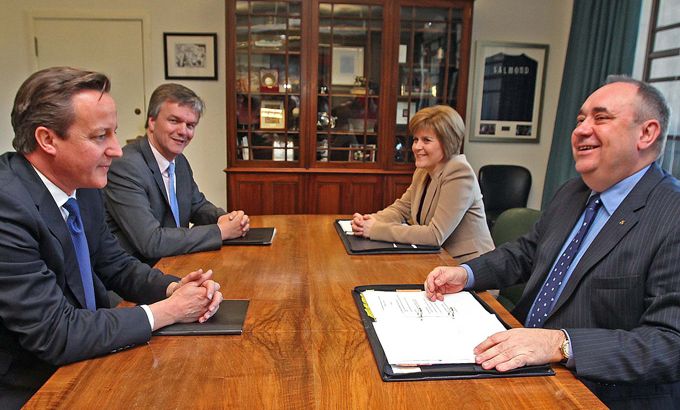
Will the United Kingdom be divided?
As a deal for a historic referendum on Scottish independence is signed, we ask if Scotland can really go it alone.
David Cameron, the British prime minister, and Alex Salmond, Scotland’s first minister, have approved plans for a historic referendum on Scottish independence, which some describe as the biggest political decision in 300 years.
|
“Independence and devolution are very different things …. Devolution in Scotland is changing, more powers are coming including the biggest suite of fiscal powers … so there’s a lot changing … and this decision is about whether you want to be part of that devolved process or whether you want to be an independent nation state.” – Ruth Davidson, Scottish Conservative Party leader |
The simple Yes or No vote is expected to be held in the autumn of 2014.
Salmond says splitting from Great Britain will allow the creation of a fairer and more prosperous Scotland. Meanwhile, Cameron says preventing division of the UK is his number one priority.
“The question for the Scottish people is do you trust in yourselves sufficiently to run your own economy, run your own affairs … so it’s a very very profound thing,” said Al Jazeera’s correspondent Laurence Lee.
England and Scotland have had a tumultuous and testing relationship over the centuries, even coming to blows on the battlefield.
In the end, it was economic hardship to a large extent that resulted in the Act of Union between Scotland and England in 1707 – leading to the birth of the United Kingdom.
|
“For those who propose or oppose independence and have some other options … shortly they’ll have to put those options on the table so that people of Scotland have clarity what they are voting for and indeed what they could be voting against …. The uncertainty lies with the anti-independence parties not with the SNP and our coalition that supports independence for our country. That’s democratic, we are delivering on a mandate we secured in a democratic election in May 2011. “ – Derek Mackay, a Scottish government minister |
But sentiment for Scottish sovereignty never really went away, and the home rule movement began in earnest in the mid-19th century.
The Scottish National Party was established in 1934, and with it began the push for a Scottish parliament.
Although the first referendum on devolution failed in 1979 a second vote in 1997 succeeded. And two years later Scotland had its own parliament but one with limited powers and dominated by non-nationalist parties.
It was only in May last year that the Scottish National Party won elections and a majority in parliament, so campaigning for a referendum on full independence came a step closer.
So, will the UK be divided? And will Scotland fare better as a devolved country?
Inside Story, with presenter Mike Hanna, discusses with guests: Derek Mackay, the minister for local government and planning in the Scottish government; Lesley Riddoch, a writer and broadcaster; and Ruth Davidson, the Scottish Conservative Party leader.
|
“Scots have shown in a series of recent opinion polls that the majority of them wanted to be able to express a preference for something in between independence and the status quo. They wanted to be able to [have a] say, they wanted more powers to be transferred to Scotland to be a meatier sort of deveolved government. And that option has been ruled out by going for this supposedly clarity creating single question. Now you know it will ask a question, but is it the question that people want answered? Fifty-six per cent of Scots have said they wanted to have three options to choose between but people have decided, politicians have decided it suits them better to have only two options that we must all choose between and that to me is not quite democratic.” Lesley Riddoch, a writer and broadcaster |
___________________________________________________________________________________________________
SCOTTISH INDEPENDENCE
- The UK prime minister has offered to give Scots more power if they vote against independence
- Scotland’s first minister proposed the referendum on independence
- Scotland has had significant autonomy since 1997 and has had control over education, health and justice
- Independence will allow Scotland to pursue its own foreign policy
- Total independence would give Scotland control over energy